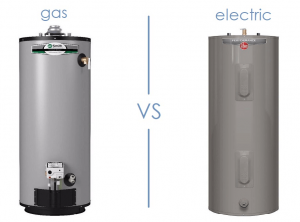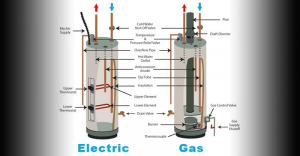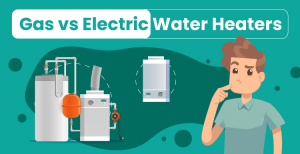Last Updated on April 10, 2022 by Kevin Chen
The debate over natural gas vs. electric water heaters can be perplexing. After all, the end effect is the same with either (hot water), so they must be more or less interchangeable, right? That’s not the case. We’ll look at the differences between gas and electric water heaters in this article to help you decide which is best for your home.
Understanding Water Heater Energy Usage
When most of us turn on the faucet, we don’t give a second thought to how the hot water arrives – unless it doesn’t. We tend to take our hot-water heaters for granted in our houses.
However, disregarding your hot-water heater could mean preceding an opportunity to save money on your hot-water heater. After all, water heater energy accounts for roughly 18 percent of the average power bill. There are a few different techniques to save energy with a water heater. However, understanding how to select an energy-efficient hot-water heater from the start is the most effective approach to reduce your energy expenditures from the moment the heater is turned on.
Gas Water Heater vs. Electric: Why Should You Care?
Let’s start with the question posed in the opening sentence of this article: does the debate even matter? Your water heater, for example, accounts for up to 18% of your total energy consumption at home. As a result, ensuring you have the most efficient unit based on your demands (your neighbor’s needs may differ from yours) might help you save a significant amount of money each month.
Of course, while deciding between a gas and an electric water heater, you must also consider the cost of the unit. Different types of water heaters are available at various price ranges, which may impact your final decision.
Gas Water Heater or Electric: Factors to Consider
Let’s take a closer look at each type of water heater to better understand their properties before comparing them.
Gas Water Heaters
This sort of water heater, as its name implies, runs on natural gas. A gas burner heats the water as it enters the tank. Warm water rises to the top of the tank and is sent to your faucets or shower heads as needed via a discharge pipe. This is a very basic description of how water heaters operate.
While gas water heater explosions sometimes occur, these mechanisms (which are highly advanced in current water heaters) make this unusual. That is to say; gas water heaters are extremely efficient and excellent in keeping your home cool. While we’ll go through costs in greater depth later, it’s worth noting that natural gas is typically far less expensive than electricity. Another significant advantage of gas water heaters is that they are environmentally friendly.
Electric Water Heaters
Electric water heaters work in much the same way as gas water heaters, except for the obvious. To initiate the convection process, electric water heaters employ a heating element instead of a gas burner. Aside from that, the components of electric and gas water heaters are identical. However, their power source is a significant differential because, as previously said, electricity in the United States is significantly more expensive than natural gas.
In addition, if your electricity goes out, your hot water will go out as well. This isn’t the case with most typical gas water heaters; while they utilize power, they can operate independently. If you’re thinking about getting an electric water heater but live in a region where power outages are common, keep this in mind.
Gas vs. Electric Water Heater
A water heater is an essential part of every home, and, likely won’t notice it until it goes down. Because a water heater’s usual lifespan is between 8 and 15 years, every homeowner will probably have to repair at least one of them over time.
Gas and electricity are the two most common fuel types for a typical water heater. Both have advantages and disadvantages to consider. The distinctions between them are outlined below so you can make an informed decision about which one is best for your home.
Size
Water heaters are affected by their size in two ways. For starters, most individuals are familiar with gallons. In general, the more water tank stores, the larger it will be. Electric and gas warmers are available in various sizes ranging from 20 to 100 liters. On the other hand, electric heaters can be used as point-of-origin heaters. This little water heater is installed right at a tap to give hot water on demand for items like tea.
Second, an electric water heater will take up slightly less space in your basement or utility room than a gas water heater. Because gas heaters must vent, they are somewhat larger and have pipes that must escape your home, limiting their placement. Electric heaters are more compact, giving you more options for placement.
Efficiency
When comparing the efficiency of an electric water heater to that of a gas unit, electric heaters win. Even though gas water heaters are less expensive to operate monthly due to the low cost of natural gas, they require more energy and emit trash into the environment. Because the gas waste absorbs some heat, it is inefficient compared to electric water heaters.
On the other hand, electric heaters use the majority of the energy they receive to heat water, making them more energy-efficient. Certain high-efficiency gas heaters on the market use less energy overall. These systems are usually labeled with the Energy Star logo.
Performance
In roughly an hour, a gas heater can heat a 50-gallon tank. It has a far faster recovery rate (the time it takes to reheat a water tank after usage) than an electric heater. Traditional gas water heaters also have the advantage of operating in the case of a power loss. A gas heater is usually a better choice for families of four or more people than an electric heater, as an electric heater will struggle to keep up with the hot water demands of a bigger household.
The biggest drawback of an electric water heater is the slow recovery rate. It takes several hours to recover a conventional 50-gallon tank. Electric appliances are also susceptible to power outages and will not function if one occurs.
Hot Water Availability
There are a few aspects to consider when comparing the two options regarding hot water availability. The first is energy supply, which is important since while not every home has access to a gas connection, nearly every home has access to electricity. You will always have hot water with an electric heater as long as there is no power interruption. However, if there is no damage to the gas line, gas heaters can continue to heat your water even if there is a power outage.
Another thing to think about is the first–hour rating, which tells you how much hot water the tank can produce in the first hour of use (FHR). FHR values are available for both gas and electric tanks. More water will be available faster if the number is greater. On the other hand, gas heaters heat up faster than electric heaters; hence the FHR on a gas heater is frequently higher.
Energy-Efficiency
While natural gas water heaters are less expensive, electric heaters are more efficient. This is because of the way the heaters work. The spent gas from a gas heater must be vented, taking some of its heat. An electric heater converts nearly all of the energy it absorbs into hot water, resulting in minimal waste.
There are high-efficiency gas heaters on the market that use much less energy in the long run. The Energy Star designation is exclusively given to this type of tank heater. There are no high-efficiency electric tank warmers on the market.
Installation
Replacing a gas water heater with a gas or electric one, or an electric water heater with another electric one, is usually a simple procedure. When an electric heater is installed, it is piped and grounded. A gas heater with an existing gas supply has been plumbed, connected to the gas supply, and established the vent.
When moving from electric to gas, the challenge arises. The tank is plumbed like the others in a new gas heater installation, but a gas line must be built to the new position. Then a vent must be built, which may require cutting or drilling into the home’s side. This can add to the installation’s time and cost.
Costs
Electric water heaters are less expensive to buy but more costly to operate in the long run. Electric heaters are less expensive since they have fewer parts. They’re also easier to install, which means lower installation expenses. However, the same amount of energy from natural gas costs more per month than electricity. While a gas heater is a less expensive upfront, it may save you money in the long run by lowering your energy costs.
The cost of running a gas or electric water heater every month is determined by how much warmth you require, the size of your home, the amount of water you use, and the price of gas or electricity in your area. However, data suggest that a gas water heater will cost roughly $30 per month for the average home, while an electric heater will cost around $42.
Electric water heaters cost between $300 and $700, while gas heaters cost $400 and $800. Electric heater installation expenses range from $700 to $1,000, while gas heater installation costs range from $1,000 to $2,000, depending on whether you already have a gas connection and vent. A 40-gallon electric water heater will cost between $1000 and $1700, and a 40-gallon gas water heater would cost between $1,400 and $2,800.
Maintenance
Water heaters, both gas and electric are quite simple to maintain. Both should be flushed regularly to prevent silt from accumulating on the tank’s bottom and limiting its lifespan. If particulates from the gas build up inside some gas tanks, the vent may need to be cleaned. To avoid gas leaks, all gas lines should be inspected regularly.
Safety Concerns
You risk a gas leak and, as a result, an explosion if you have a natural gas appliance or gas line in your home. Carbon monoxide leaks are also more likely in your home. Proper vent maintenance and regular checks on the gas line are required to avoid these problems. These dangers do not exist with electric water heaters.
Environmental Concerns
If you want to live green and have a low environmental impact, it’s a good idea to think about the environmental impact of each decision. Electric heaters are better for the environment since they are more energy-efficient and may be fuelled by renewable energy sources such as solar and hydroelectric electricity.
Natural gas, which must be taken from the Earth in a costly and harmful process that releases significant amounts of greenhouse gases into the atmosphere, is the only possible energy source for gas water heaters. Gas heaters are also less efficient in general, making them less environmentally friendly.
Frequently Asked Questions
Which is more cost-effective to operate: a gas or electric water heater?
Natural gas is generally less expensive in terms of energy use.
Should I replace my gas water heater with an electric one?
You don’t have to switch unless your water heater has troubles and you’re in the market for a replacement. Both gas and electric water heaters are commonly used in the business, and both can last for many years.
Conclusion
Surely that’s it, then, right? Gas water heaters are more energy-efficient than electric ones, costing less in the long run, so they must be the way to go! Not necessarily.
If your water heater needs to fit within a very tight space, an electric water heater would be advantageous as they tend to be much smaller. Electric water heaters also don’t require venting, making them much cheaper and easier to install.
If you’re in severe need of a new water heater but are short on cash, the price difference between a gas and an electric water heater may persuade you to go with the latter.
If you get more questions regarding electrical components, do not forget to contact us at ICRFQ, we are the best electrical components manufacturers in China.
If you want to find more Electronic Components Distributors, please check out the following articles:
Electronic Components Distributors In the USA
Electronic Components Distributors In UK
Electronic Components Distributors In China
Electronic Components Distributors In India
Electronic Components Distributors In Singapore
Electronic Components Distributors In Malaysia
Electronic Components Distributors In Vietnam
Electronic Components Distributors In South Korea
- Where to buy IC chips? The Best Guide? - March 26, 2024
- Breaking Down Barriers: Overcoming Obstacles in Cross-Border Electronic Component Trade - March 4, 2024
- Everything You Need to Know About Amplifier IC Chips - March 4, 2024







